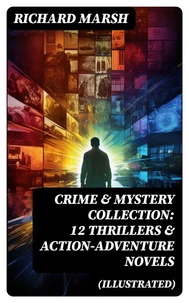Amusement Only. Temptation and Deceit in Victorian London
Par :Formats :
Disponible dans votre compte client Decitre ou Furet du Nord dès validation de votre commande. Le format ePub est :
- Compatible avec une lecture sur My Vivlio (smartphone, tablette, ordinateur)
- Compatible avec une lecture sur liseuses Vivlio
- Pour les liseuses autres que Vivlio, vous devez utiliser le logiciel Adobe Digital Edition. Non compatible avec la lecture sur les liseuses Kindle, Remarkable et Sony
 , qui est-ce ?
, qui est-ce ?Notre partenaire de plateforme de lecture numérique où vous retrouverez l'ensemble de vos ebooks gratuitement
Pour en savoir plus sur nos ebooks, consultez notre aide en ligne ici
- Nombre de pages246
- FormatePub
- ISBN406-4-06-623675-5
- EAN4064066236755
- Date de parution06/12/2019
- Protection num.Digital Watermarking
- Taille742 Ko
- Infos supplémentairesepub
- ÉditeurGOOD PRESS
Résumé
In "Amusement Only, " Richard Marsh crafts a compelling narrative that delves into the underbelly of early 20th-century entertainment, weaving a tale that explores the intersection of desire, morality, and modernity. Set against the backdrop of London's vibrant leisure culture, the novel employs a rich, descriptive style that captures the excitement and danger of amoral pursuits. Marsh's use of psychological depth and atmospheric settings not only reveals the temptations of this burgeoning era but also critiques the societal values that allow such vices to flourish, drawing a nuanced portrait of a world on the brink of modernity.
Richard Marsh, an acclaimed author and a contemporary of the fin-de-si?®cle literary movement, was influenced by his fascination with the supernatural and the complexities of human nature. His own experiences as a novelist and journalist shaped his perceptions of the entertainment industry, prompting him to explore the darker side of amusement in an age where technology and spectacle began to redefine human interaction.
Marsh's oeuvre reflects his keen interest in the conflicts between social expectation and personal desire, making him a significant voice in understanding the cultural dynamics of his time. "Amusement Only" is highly recommended for readers interested in the psychological intricacies of character development and the thematic exploration of societal constraints. Marsh's vivid prose and thoughtful critique serve as an engaging lens through which to examine contemporary issues of pleasure and excess.
This novel not only entertains but invites contemplation of the moral implications of amusement in both the past and present.
Richard Marsh, an acclaimed author and a contemporary of the fin-de-si?®cle literary movement, was influenced by his fascination with the supernatural and the complexities of human nature. His own experiences as a novelist and journalist shaped his perceptions of the entertainment industry, prompting him to explore the darker side of amusement in an age where technology and spectacle began to redefine human interaction.
Marsh's oeuvre reflects his keen interest in the conflicts between social expectation and personal desire, making him a significant voice in understanding the cultural dynamics of his time. "Amusement Only" is highly recommended for readers interested in the psychological intricacies of character development and the thematic exploration of societal constraints. Marsh's vivid prose and thoughtful critique serve as an engaging lens through which to examine contemporary issues of pleasure and excess.
This novel not only entertains but invites contemplation of the moral implications of amusement in both the past and present.
In "Amusement Only, " Richard Marsh crafts a compelling narrative that delves into the underbelly of early 20th-century entertainment, weaving a tale that explores the intersection of desire, morality, and modernity. Set against the backdrop of London's vibrant leisure culture, the novel employs a rich, descriptive style that captures the excitement and danger of amoral pursuits. Marsh's use of psychological depth and atmospheric settings not only reveals the temptations of this burgeoning era but also critiques the societal values that allow such vices to flourish, drawing a nuanced portrait of a world on the brink of modernity.
Richard Marsh, an acclaimed author and a contemporary of the fin-de-si?®cle literary movement, was influenced by his fascination with the supernatural and the complexities of human nature. His own experiences as a novelist and journalist shaped his perceptions of the entertainment industry, prompting him to explore the darker side of amusement in an age where technology and spectacle began to redefine human interaction.
Marsh's oeuvre reflects his keen interest in the conflicts between social expectation and personal desire, making him a significant voice in understanding the cultural dynamics of his time. "Amusement Only" is highly recommended for readers interested in the psychological intricacies of character development and the thematic exploration of societal constraints. Marsh's vivid prose and thoughtful critique serve as an engaging lens through which to examine contemporary issues of pleasure and excess.
This novel not only entertains but invites contemplation of the moral implications of amusement in both the past and present.
Richard Marsh, an acclaimed author and a contemporary of the fin-de-si?®cle literary movement, was influenced by his fascination with the supernatural and the complexities of human nature. His own experiences as a novelist and journalist shaped his perceptions of the entertainment industry, prompting him to explore the darker side of amusement in an age where technology and spectacle began to redefine human interaction.
Marsh's oeuvre reflects his keen interest in the conflicts between social expectation and personal desire, making him a significant voice in understanding the cultural dynamics of his time. "Amusement Only" is highly recommended for readers interested in the psychological intricacies of character development and the thematic exploration of societal constraints. Marsh's vivid prose and thoughtful critique serve as an engaging lens through which to examine contemporary issues of pleasure and excess.
This novel not only entertains but invites contemplation of the moral implications of amusement in both the past and present.








